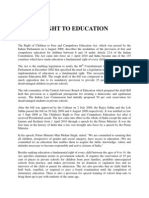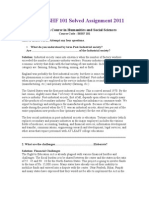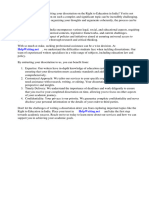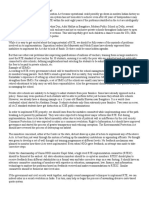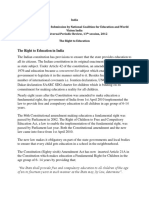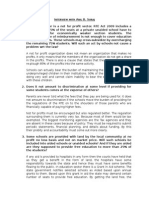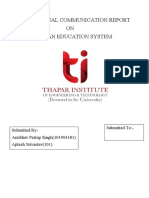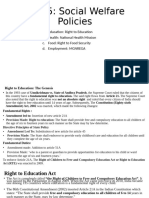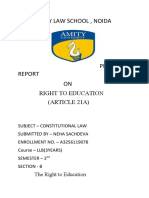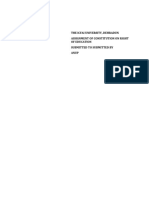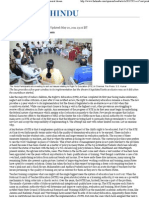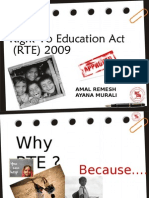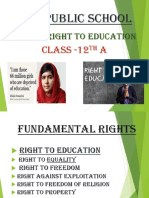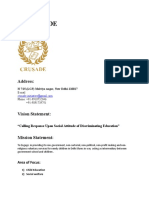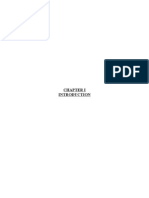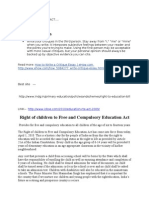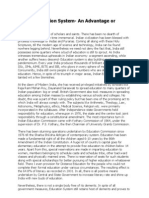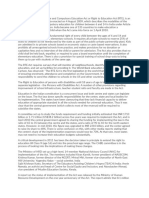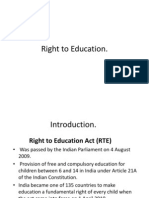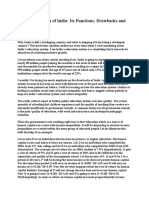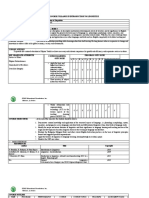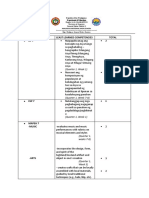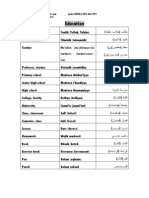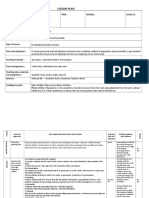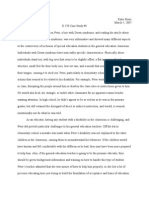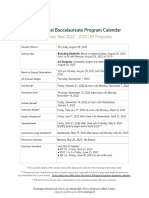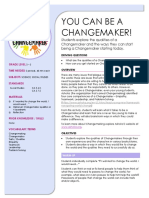GHSDFHG
GHSDFHG
Uploaded by
nokarCopyright:
Available Formats
GHSDFHG
GHSDFHG
Uploaded by
nokarOriginal Description:
Original Title
Copyright
Available Formats
Share this document
Did you find this document useful?
Is this content inappropriate?
Copyright:
Available Formats
GHSDFHG
GHSDFHG
Uploaded by
nokarCopyright:
Available Formats
The Right to Education Act (RTE) of 2009 is a remarkable law in India that ensures
free and mandatory education for children aged between six to fourteen,
irrespective of their gender, caste, social status etc. The RTE Act mandates that
all schools, including private and government schools, must reserve 25% of their
seats for children from economically disadvantaged backgrounds ensuring all
children in India receive elementary education and establish set standards for the
infrastructure and quality of education that schools provide.
While the Right to Education Act has been a significant step towards access to
education for all children, its implementation has faced several challenges,
including inadequate infrastructure and resources, lack of trained teachers, and
insufficient funding despite continuous effort of the government bodies..
Nevertheless, the RTE Act remains essential legislation that has helped millions of
children in India access quality education
Bal Raksha Bharat (also known as Save the Children) is a non-profit organisation
that works towards promoting and protecting the right to education for all children
along other initiatives like Health & Nutrition, Child Protection and Resilience.
Their programmes have been designed to better the lives of underprivileged
children, improving access to quality education for children from marginalised
communities and eliminating barriers preventing children from accessing education.
They also provide training to teachers, parents, and community members on child
protection and safeguarding through their Child Protection Programme, which helps
prevent and respond to instances of child exploitation.
The organisation is committed to working with communities, governments, and other
stakeholders to ensure that every child has access to quality education and the
chance to a brighter future.
The RTE Act is a "Right of Free and Compulsory Education" at least till the level
of elementary school. It has a noble objective and a necessary one too seeing
India's demographic status.
But, I hate the Act for the following reasons:
Infringement on private institutions: We have a sinister notion that privately run
organisations are crooks and thieves. We already had a standardized syllabus and
standardized tests. Was it not enough? Now we have to contend with specifics of
laboratories, playground etc. It would have been logical if the rules specified
learning outcomes.
No learning objectives: The Act specifies that no student should be detained till
the 8th standard. There is talk of scrapping the SSC exam. We already made the
exams bad by reducing the complexity. This fails to create any incentive in
students to perform well and pass.
25% reserved seats: Free education to people from disadvantaged background should
be provided. This is wrong. The reason is that the private schools had sufficient
number of students who were willing to pay fees. To add the 25% quota is denying
the otherwise capable students from taking admission to the school of their choice.
Fees: Not many schools want to loot students and profit. But they need some profit
to reinvest in infrastructure. 25% of seats are paid for by the government. The
payments are not released for years. The government decides the quantum of payment
and does not consult schools. Also, schools cannot impose additional costs on
students (such as standardized uniforms, funds for excursions etc). All this makes
schools poor. So they cannot create new infrastructure, maintain the existing and
hire the best staff.
No Extra coaching: Schools are forbidden from conducting bridge classes or extra
coaching for the disadvantaged students. No material except the approved textbooks
are allowed to be taught in classes. My school had some innovative books which were
self published to introduce students to better literature and history.
All this has put the schools at the mercy of officers. Bribe taking was common
earlier as well, but the RTE has opened up a can of worms by making rules more
stringent. A school with a student teacher ratio of greater than 1:30 or a slightly
smaller playground can still be an effective and professional school. It is the
strengthening of licence raj in education.
The UPA government brought this law to "help" the disadvantaged in India. It is now
instrumental is shutting down more than 5000 schools in India. Learning outcomes
have dipped as well according to a survey by NGO Pratham.
It is the classic case of government inefficiency and inadequacy pushed on the
private sector.
You might also like
- Right To Education Act PolityDocument4 pagesRight To Education Act PolityMåńøj MåñđäľNo ratings yet
- Education For Social Change With Reference To Right To Education Act 2009 in IndiaDocument4 pagesEducation For Social Change With Reference To Right To Education Act 2009 in Indiasrik1011No ratings yet
- Highlights: Indian Parliament India Indian ConstitutionDocument4 pagesHighlights: Indian Parliament India Indian Constitutiongautam_hariharanNo ratings yet
- Right To EducationDocument18 pagesRight To EducationIshan RathiNo ratings yet
- Condition of Education System in India: Education and Directive PrinciplesDocument5 pagesCondition of Education System in India: Education and Directive PrinciplesAnonymous G9PLGNNo ratings yet
- Promoting Education TO ALLDocument33 pagesPromoting Education TO ALLSIDDHI LIKHMANINo ratings yet
- EssayDocument3 pagesEssaynikhilNo ratings yet
- IGNOU BSHF 101 Solved Assignment 2011Document8 pagesIGNOU BSHF 101 Solved Assignment 2011wwerockyou3No ratings yet
- Right To Education Act: What Is The Act About?Document2 pagesRight To Education Act: What Is The Act About?Rajat KashyapNo ratings yet
- Right To By-Sarthak Neema (BBA.L.L. B) Sap Id (81022018020)Document5 pagesRight To By-Sarthak Neema (BBA.L.L. B) Sap Id (81022018020)Sarthak NeemaNo ratings yet
- Dissertation On Right To Education in IndiaDocument5 pagesDissertation On Right To Education in IndiaPaySomeoneToWriteAPaperUK100% (1)
- Poor Educational StandardDocument3 pagesPoor Educational Standardroshan60% (5)
- India Read Education SystemDocument4 pagesIndia Read Education SystemM Amudha ValliNo ratings yet
- RTE: Will It Lead To Inclusive Education?Document1 pageRTE: Will It Lead To Inclusive Education?Anil DuttNo ratings yet
- Sarva Shiksha AbhiyaanDocument14 pagesSarva Shiksha Abhiyaansachin1065No ratings yet
- Right To Education CompositionDocument3 pagesRight To Education CompositionVenkatesh ManickamNo ratings yet
- Right To EducationDocument8 pagesRight To EducationSAKSHI GOYALNo ratings yet
- JS6 UPR IND S13 2012 JointSubmission6 EDocument9 pagesJS6 UPR IND S13 2012 JointSubmission6 EDidini PachuauNo ratings yet
- Inclusive Education &right To EducationDocument18 pagesInclusive Education &right To EducationMadhu Mahesh RajNo ratings yet
- Interview With Anil BDocument3 pagesInterview With Anil BR Gandhimathi RajamaniNo ratings yet
- Professional Communication Report ON Indian Education SystemDocument17 pagesProfessional Communication Report ON Indian Education SystemanubhavNo ratings yet
- Education in India Is Provided by TheDocument4 pagesEducation in India Is Provided by TheAnonymous f5qGAcZYNo ratings yet
- unit 5Document18 pagesunit 5hacker04nitinNo ratings yet
- IJCRT2311291Document4 pagesIJCRT2311291Shama ParveenNo ratings yet
- Consti Group Research Ppr-Law and Women EmpowermentDocument12 pagesConsti Group Research Ppr-Law and Women Empowermentvarunshroff865No ratings yet
- The Right To EducationDocument13 pagesThe Right To EducationnehaNo ratings yet
- Education in India A Detailed AnalysisDocument33 pagesEducation in India A Detailed AnalysisChandan SinghNo ratings yet
- The Icfai University, Dehradun Assignment of Constitution On Right of Education Submitted To Submitted by AnupDocument18 pagesThe Icfai University, Dehradun Assignment of Constitution On Right of Education Submitted To Submitted by AnupAman jainNo ratings yet
- The Icfai University, Dehradun Assignment of Constitution On Right of Education Submitted To Submitted by AnupDocument18 pagesThe Icfai University, Dehradun Assignment of Constitution On Right of Education Submitted To Submitted by AnupAman jainNo ratings yet
- 16 +DR RajivKumarDocument14 pages16 +DR RajivKumarnki5No ratings yet
- Right To Education ACT, 2009: SOME ReflectionsDocument15 pagesRight To Education ACT, 2009: SOME ReflectionsTruex FriendNo ratings yet
- Abs ResearchDocument23 pagesAbs ResearchNavya BhandariNo ratings yet
- Education in India: History of Indian Education SystemDocument4 pagesEducation in India: History of Indian Education SystemAyushi SrivastavaNo ratings yet
- Why RTE Remains A Moral DreamDocument2 pagesWhy RTE Remains A Moral DreamKrishna ChaitanyaNo ratings yet
- Right To EducationDocument21 pagesRight To EducationAmal RemeshNo ratings yet
- Topic:Right To Education Act: Challenges & RemediesDocument14 pagesTopic:Right To Education Act: Challenges & RemediesNikhil Kalyan AJNo ratings yet
- Right Ho Elementary EducationDocument60 pagesRight Ho Elementary EducationShobha J PrabhuNo ratings yet
- M.M Public School: TopicDocument12 pagesM.M Public School: TopicSanchit RajaNo ratings yet
- Crusade: AddressDocument10 pagesCrusade: AddressRishi ShuklaNo ratings yet
- Right To Education ActDocument6 pagesRight To Education ActRIYA GARGNo ratings yet
- Art 21ADocument14 pagesArt 21AAbhishek SharmaNo ratings yet
- Tips & Warnings: Critique-Essay - Html#ixzz0wqa923uqDocument3 pagesTips & Warnings: Critique-Essay - Html#ixzz0wqa923uqHärîsh KûmärNo ratings yet
- CBSE Vs SamacheerDocument33 pagesCBSE Vs SamacheerKeerthi SruthiNo ratings yet
- Education in India - A Detailed AnalysisDocument33 pagesEducation in India - A Detailed AnalysisAaminNo ratings yet
- Right To Education Act 2009Document11 pagesRight To Education Act 2009Rda ChhangteNo ratings yet
- Right To Education in IndiaDocument5 pagesRight To Education in IndiaYavanika SharmaNo ratings yet
- Right To Education ActDocument3 pagesRight To Education ActŚhamli Shah100% (1)
- Right To EducationDocument14 pagesRight To EducationShivansh soniNo ratings yet
- A Study of Right To Education-In Theory and PracticeDocument3 pagesA Study of Right To Education-In Theory and PracticeAmit RathorNo ratings yet
- Indian Education SystemDocument3 pagesIndian Education SystemFreeman FreelifeNo ratings yet
- Population & EducationDocument2 pagesPopulation & EducationUmakanta DashNo ratings yet
- The Right of Children To Free and Compulsory Education Act or Right To Education ActDocument2 pagesThe Right of Children To Free and Compulsory Education Act or Right To Education Actvinod panwarNo ratings yet
- Bbmun 22 LS BGDocument36 pagesBbmun 22 LS BGAditya GillNo ratings yet
- Right To EducationDocument14 pagesRight To EducationPramod Savkare67% (3)
- SDG 4 Quality Education Countries With The Best Education System 1. JapanDocument21 pagesSDG 4 Quality Education Countries With The Best Education System 1. JapanJB LabraNo ratings yet
- Education System in IndiaDocument57 pagesEducation System in IndiaswadeshsxcNo ratings yet
- Education System of IndiaDocument3 pagesEducation System of IndiaMunish DograNo ratings yet
- Elementary EducationDocument36 pagesElementary EducationH Janardan PrabhuNo ratings yet
- Training Delivery Modes and Methods - 20240305 - 001157 - 0000Document51 pagesTraining Delivery Modes and Methods - 20240305 - 001157 - 0000nicolasdanica018No ratings yet
- B1 G3 LEDESMA Sana May Next Pa - 1Document96 pagesB1 G3 LEDESMA Sana May Next Pa - 1Nabu NabuangNo ratings yet
- Homework Policy in Other CountriesDocument6 pagesHomework Policy in Other Countriesafetqwyic100% (1)
- Task 2 - Write Your Obligations and Needs in Your Daily RoleDocument7 pagesTask 2 - Write Your Obligations and Needs in Your Daily RoleFernando FallaNo ratings yet
- My Homework Lesson 4 Arrays and MultiplicationDocument6 pagesMy Homework Lesson 4 Arrays and Multiplicationafmtqdkpe100% (1)
- Using A Variety of Informative Persuasive and Argumentative Writing TechniquesDocument6 pagesUsing A Variety of Informative Persuasive and Argumentative Writing Techniquesmarinel de claroNo ratings yet
- Syllabus - Introduction To LinguisticsDocument9 pagesSyllabus - Introduction To LinguisticsEdel Mae OpenaNo ratings yet
- Entrep Module 10 - Business ImplementationDocument3 pagesEntrep Module 10 - Business ImplementationJOHN PAUL LAGAO100% (1)
- Subject Least Learned Competencies Total: (Quarter 1, Week 1)Document3 pagesSubject Least Learned Competencies Total: (Quarter 1, Week 1)ELMA SALSONANo ratings yet
- Education: Basel Nejem Email: BaselnejemDocument4 pagesEducation: Basel Nejem Email: Baselnejemmsayed_80No ratings yet
- Lesson Plan in Science 6Document6 pagesLesson Plan in Science 6Cristian Odchigue NartiaNo ratings yet
- B1+ (01) Vocabulary-Apearance PersonalityDocument3 pagesB1+ (01) Vocabulary-Apearance PersonalityMalik Hamza100% (3)
- Session 3-1: Financial Literacy and Household Behavior Implications For Asia by Joanne YoongDocument20 pagesSession 3-1: Financial Literacy and Household Behavior Implications For Asia by Joanne YoongADBI Events100% (2)
- Case Study - PeterDocument5 pagesCase Study - Peterkatstone100% (1)
- NsatDocument2 pagesNsatAvani GuptaNo ratings yet
- Ashleigh James: ObjectiveDocument3 pagesAshleigh James: Objectiveapi-535591681No ratings yet
- Chinese Education System - Comparison - FINALDocument10 pagesChinese Education System - Comparison - FINALVine Grace Martin100% (1)
- How To Hold A 10-Minute PresentationDocument22 pagesHow To Hold A 10-Minute PresentationR.D.LNo ratings yet
- PLP FLP Assignment Fall 2013Document2 pagesPLP FLP Assignment Fall 2013api-240168285No ratings yet
- Carlin Emilee ResumeDocument1 pageCarlin Emilee Resumeapi-438871347No ratings yet
- Module Diagnostic TestDocument4 pagesModule Diagnostic TestQuincy Mae MontereyNo ratings yet
- ISTQB Exam Frequently Asked QuestionsDocument1 pageISTQB Exam Frequently Asked QuestionsUma KatariNo ratings yet
- 기출편집 수능감잡기 11강Document18 pages기출편집 수능감잡기 11강oname18No ratings yet
- DamasingDocument25 pagesDamasingLyza RaraNo ratings yet
- Role of Educational Institutes in GuidanceDocument12 pagesRole of Educational Institutes in GuidanceDr. Nisanth.P.M100% (2)
- Student Handbook F KK 2014Document119 pagesStudent Handbook F KK 2014Fatin HasniNo ratings yet
- Utew 311 Assignment 1 PPT Presentation - 4Document12 pagesUtew 311 Assignment 1 PPT Presentation - 4MphoNo ratings yet
- Ermitage Academic Calendar IBP 2022-23Document1 pageErmitage Academic Calendar IBP 2022-23NADIA ELWARDINo ratings yet
- Industrial-Training-Guidelines & Procedures-2022Document26 pagesIndustrial-Training-Guidelines & Procedures-2022Siva Prasad Ingeti100% (1)
- You Are A ChangemakerDocument7 pagesYou Are A Changemakerapi-396281619No ratings yet



